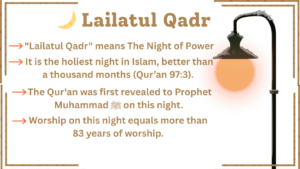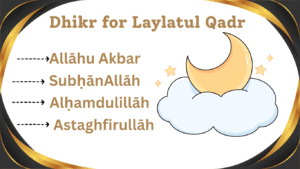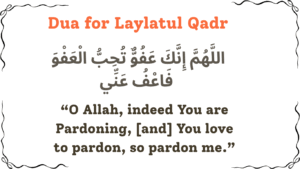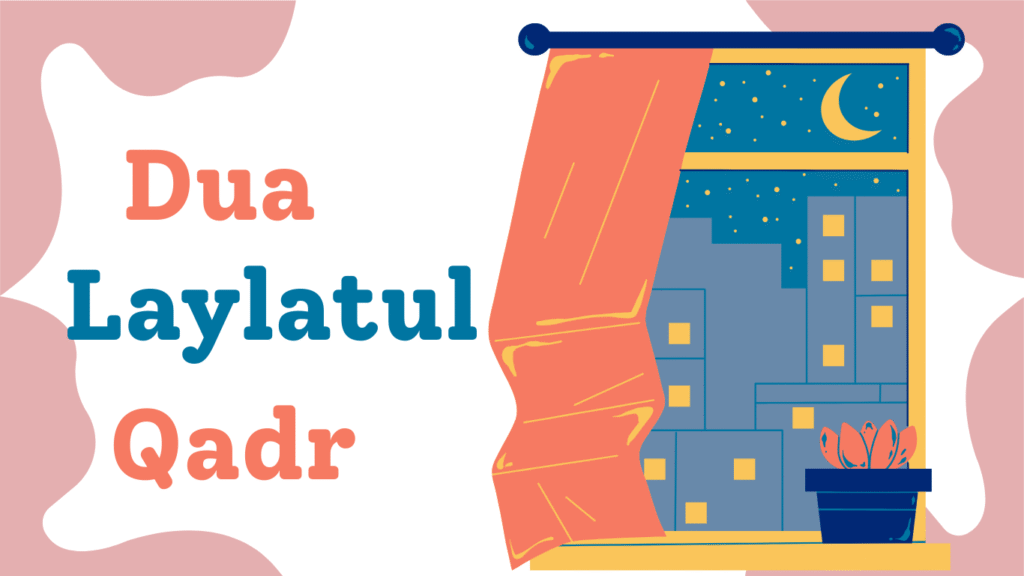Introduction
Laylatul Qadr, the Night of Power, is the holiest night in the Islamic calendar. It commemorates the night the verses of the Holy Quran were revealed to the Prophet Muhammad (PBUH) through the Angel Jibril. As Allah says in the Quran: “The Night of Decree is better than a thousand months” (Quran, 97:3). There are no specific prescribed acts, but Muslims are encouraged to follow the example of the Messenger and strive in worship during this precious time to maximize their devotion.
As Allah says in the Quran:
During this blessed night, Muslims worldwide eagerly anticipate Laylatul Qadr, fully recognising its profound significance and boundless blessings. It is a moment for deep introspection, sincere supplication, and seeking closeness to Allah (SWT). This article aims to highlight the essence and importance of the night, and guide you with specific duas that can help elevate your connection with your Creator.

What is Laylatul Qadr?
Laylatul Qadr, also known as the Night of Power, is a beacon of spiritual illumination in the holy month of Ramadan. It is believed to be a night filled with immense blessings and rewards, surpassing the value of a thousand months. In my own experience, spending this night in quiet prayer brings peace like no other, and each year it reminds me how precious one single night can be.
Meaning of the word “Laylatul Qadr”
The term Laylatul Qadr is derived from Arabic, where Laylat means night and Qadr holds deep meanings like power, decree, and destiny. It reflects the extraordinary spiritual significance of a night when divine decrees are made, destinies are shaped, and blessings truly abound. In my reflection, it’s a time when the unseen carries more weight than the seen, reminding us of the quiet strength in every divine moment.
Read More:Dua After Salah
What to pray on Laylatul Qadr
On Laylatul Qadr, it is a common and rewarding practice to offer Nafl or voluntary prayers while sending salutations (salawat) upon the Prophet (PBUH). The Sunnah also encourages performing I’tikaf during the last ten blessed nights of Ramadan, which means isolating yourself in the mosque to focus solely on worshipping Allah (SWT). This time is perfect for deep reflection and devotion, helping one not to miss the sacred night of Laylatul Qadr.
Hadith
On the blessed nights of Laylatul Qadr, seeking Divine closeness is key to strengthen our connection with the Lord. It is a time for reflection on the glory and beauty of Allah (SWT), His power, mercy, and kindness. Along with prayer, offering dhikr helps deepen our bond and brings peace to the heart.

Common Dhikr to recite:
- Allāhu Akbar (God is the Greatest)
- SubḥānAllāh (Glory be to God)
- Alḥamdulillāh (All praise is due to God)
- Astaghfirullāh (I seek forgiveness from Allah)
- Lā ilaha illAllāhu waḥdahoo lā sharikalahoo (There is no god but Allah, alone)
- SubhānAllāhi wa biḥamdihi (Glory be to Allah and praise Him)
- SubhānAllāhi al-‘Aẓeem (Glory be to Allah, the Supreme)
- Lā ilaha illā Anta, subḥānaka inni kuntu min al-ẓālimeen (There is no God but You, glory be to You, I was one of the wrongdoers)
Read More: Iman-e-Mufassal & Iman-e-Mujmal
1.Dua for Laylatul Qadr
Arabic
اللَّهُمَّ إِنَّكَ عَفُوٌّ تُحِبُّ الْعَفْوَ فَاعْفُ عَنِّي
Transliteration:
Translation in English:
“O Allah, indeed You are Pardoning, [and] You love to pardon, so pardon me.”
Translation in Urdu:
“اے اللہ، بے شک تو معاف کرنے والا ہے، تو معاف کرنے کو پسند کرتا ہے، اس لیے مجھے معاف کردے۔”
2.Dua for Protection Against Oppressors
Arabic:
اللَّهُمَّ إِنَّا نَجْعَلُكَ فِي نُحُورِهِمْ وَنَعُوذُ بِكَ مِنْ شُرُورِهِمْ
Transliteration:
Allahumma inna naj’aluka fi nuhurihim wa na’udhu bika min shururihim
Translation in English:
“O Allah, we seek refuge in You from the evil of every oppressor and tyrant.”

Translation in Urdu:
How many rakats for Laylatul Qadr prayer?
The sanctity of Laylatul Qadr, a special night, means that our deeds are greatly multiplied. When you pray on this night, you can perform as many voluntary prayers as you wish, but the minimum is two rakat. What truly matters is to focus with sincerity and imagine yourself standing before your Lord during the prayer.
Following the Sunnah of the Messenger Allah PBUH, it is recommended to pray eight rakat, followed by three rakat of Witr. According to Aisha RA, the Prophet never prayed more than eleven rakahs during Ramadan, often dividing them into four, four, and then three. These were described as beautiful and long. Everyone should pray within their capabilities, as Allah knows best, a teaching recorded in Bukhari and Muslim.
Read More : Istikhara ki Dua
What should you avoid on Laylatul Qadr?
Laylatul Qadr is a very sacred night meant for worship and deep reflection. It is crucial to avoid any actions that could detract from its spiritual significance. This means staying away from idle talk, gossip, arguments, or any kind of disobedience to Allah during this special time.
It’s also highly advisable to minimise distractions like excessive use of technology or social media. Instead, one should focus on prayer, recitation of the Quran, and seeking forgiveness to fully benefit from the blessings of this holy night.
Read More : 3rd Ashra Dua





